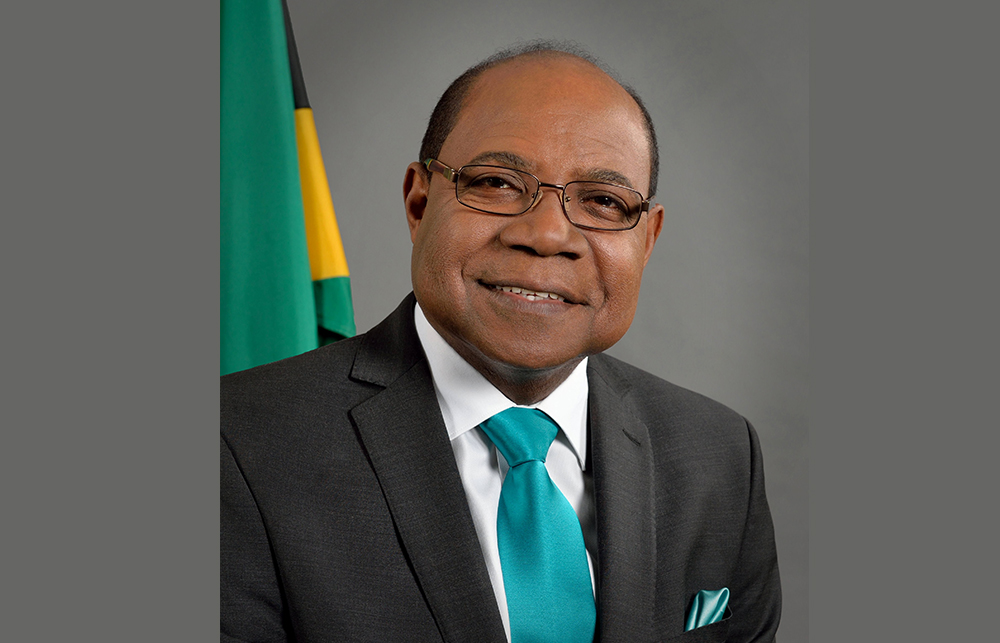
16 Dec Interview with Hon. Edmund Bartlett, Minister of Tourism, Jamaica
Opportunities open up for Middle Eastern holidaymakers, investors and tourism businesses in Jamaica, the heartbeat of the world
On your recent trip to the United Arab Emirates (UAE), you made a number of important announcements. For example, you revealed that you had initiated discussions with top representatives of the Emirates airline, with the aim of introducing a unique flight between Dubai and Jamaica early next year. Could you tell us some more about your trip to the UAE?
My visit to Dubai was initially exploratory but, critically, it was to engage in discussions with a number of key partners and players that we think are a great fit for Jamaica, particularly those that are involved in the tourism sector. The first stop on my trip was Dubai Ports (DP) World, which is one of the biggest maritime entities in the world, and highly respected and reputed.
Our discussions revolved around cruise engagements, as DP World has the largest home-port facility in the Emirates that can accommodate around a million tourists — or cruisers — which it can then transfer into the other emirates or elsewhere. We are interested in the possibility of a partnership and making Jamaica a similar home-port facility for the Caribbean, so that cruisers who are connected with DP World can have options in the summer and autumn months for a Caribbean experience. It is well known that the Caribbean is the number-one cruise destination in the world, and I’m sure many in the Emirates would like to enjoy that highly regarded experience.
The UAE represents the next critical partner in Jamaica’s tourism matrix and we thought that it was time that Gulf airlines started flying into the Caribbean — that is a major objective for us. We had very fruitful discussions with executives of the Emirates airline and I’m looking forward to continuing those discussions as we develop the possibilities of it engaging in the Caribbean. Again, Jamaica would be positioned as the region’s hub, so arrivals could come into our Montego Bay airport and then they could be transferred to other destinations in the Caribbean, South America and even North America.
The third engagement on my trip to UAE was with Emaar, a major real estate developer and, I would say, community builder. Well reputed, highly recognized and very efficient, we started a conversation with a view to having the hospitality division of that big and powerful company engaging with us to build and/or operate hotels in the Caribbean and Jamaica.
Clearly, parts of your conversations were focused on multi-destination strategies that are being formulated in the northern Caribbean to enable a more fulsome engagement with the UAE and other partners in the Middle East. How important is this regional cooperation and how can Jamaica play a role in closing the distance gap between the Gulf region and the northern Caribbean?
This is a very important tourism initiative. Multi-destination strategies offer tourists the opportunity to experience several destinations within a single vacation period, which is efficient and fulfilling for a visitor who spends more than, I would say, five days on a holiday. Jamaica sits geographically congruent to some of the best destinations in the Caribbean and the largest destinations in the wider region —Mexico, Cuba, the Dominican Republic, Panama and Colombia.
Because of our geographical location, we think that Jamaica would offer a great hub for airlines to connect with those markets, and to enjoy the benefit of being able to present a package to visitors from the Gulf region that would see them moving from country to country under one protocol. That protocol would enable them to pay a single price that would provide airlift, ground transportation, hotel reservations and even experiences by way of attractions. We think that this is a nice fit, a good fit and, indeed, it is the way forward in terms of long-haul destination visitors coming into our Caribbean space.
Before returning to Jamaica, you also visited Saudi Arabia and attended the fifth edition of its Future Investment Initiative event. How important could the Middle East overall be for Jamaica in terms of foreign direct investment, particularly for the tourism sector?
This is an engagement that we hope will be hugely powerful not just for Jamaica, but for the entire Caribbean area and there are many available investment projects. For example, within the region we are looking to mega investments and mega partnerships in order to build much of the infrastructure that is required to advance our national agendas. The capital markets in our region are limited in terms of their ability to drive that type of investment, and I think that engaging with Gulf partners would enable us to have that sort of capital injection into the region. This could be a great game changer. The point is that investment provides jobs, jobs provide income, income provides revenue and, of course, everybody benefits from that.
How did Jamaica’s tourism sector perform in 2020 and 2021, and what are your expectations for the future?
Like all other destinations, we were affected by the pandemic. March 2020 literally saw the evisceration of our tourism sector: we moved from 4.5 million visitors to zero visitors. We closed our borders at that point, but we opened up again in June 2020 and have not closed since. This is the result of good management, adherence to safety protocols and, more recently, vaccines. We have been able to bring back about 53 percent of those 4.5 million visitors. The jobs we lost during the crisis amounted to some 130,000 but, as of today, we have brought back around 70,000 of those workers.
We are now looking at tourism earnings in the region of nearly $2 billion for 2021, coming from the $3.7 billion a year that we earned prior to the pandemic. So the recovery is happening and it is happening a little faster than we anticipated. Whilst we still have issues with Covid-19 variants and the uncertainties that those offer, we hope that science will continue to advance its responses to the virus and, hopefully, we will get back to normalcy in good time. On the basis of our current trajectory, we are likely to see a full recovery of the sector by 2023 or 2024.
Do you have a final message that you would like to share with the people of the Middle East? Why should they look to Jamaica as a business or investment partner?
Jamaica is an investment-friendly country: we invite investments, we provide the right environment to retain investments and we provide the right environment for a return on investment. Over the years, we have enjoyed a very vibrant democracy, we have not had any kind of social disturbances, and we have a very advanced and positive capital market. We also have liberal foreign exchange protocols and capital gains do not attract taxes in Jamaica.
We have a very active foreign exchange programme as well. We allow repatriation of profits and also movement of assets at will, and nobody in Jamaica puts a stricture on business initiatives, which is extremely important. In addition, we have a very modern and progressive fiscal regime that guides and assists investment activity in our country, and the ease of doing business in Jamaica is at a high level. Plus, we have a highly educated population and we speak English — I think those are some important attributes for foreign investors.


Sorry, the comment form is closed at this time.